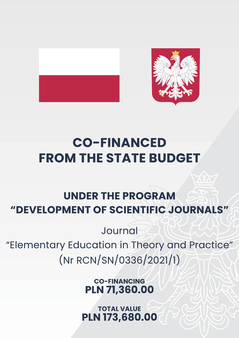Sustainable development as „the light at the end of the tunnel’’ for contemporary ecology
Abstract
The article refers to the concept of sustainable development, and presents the close relations between the environment, economy and society, and informs the reader that the development of the individual in these three areas should not be at the expense of others. Education for sustainable development, which is mentioned in the article, is a response to the growing environmental crisis, is a conviction that our behaviour needs to change. It popularises critical thinking, shapes active attitudes which favour the environment protection, it also promotes participation of the society in decision-making processes, respect for biodiversity and a holistic picture between man, society and nature.References
Bocian A.F., Procesy globalizacji a zrównoważony rozwój. Szanse Polski, [in:] Zrównoważony rozwój i ochrona środowiska w gospodarce, Wyższa Szkoła Ekonomiczna, ed. D. Kiełczewski, B. Dobrzańska, Białystok 2007, p. 147-160.
Cichy D., Obszar edukacyjny filozofii zrównoważonego rozwoju, [in:] ,,Edukacja Biologiczna i Środowiskowa’’ 2011 no 1, p. 87-91.
Czerewko G., Rudyńska I., Zrównoważony rozwój jako podstawa wzrostu gospodarczego i jakości życia, [in:] Człowiek a koncepcja zrównoważonego rozwoju, ed. B. Kościk, M. Sławińska, Wydawnictwo Wieś Jutra, Warszawa 2009, p. 33-46.
Domka L., Dialog z przyrodą w edukacji dla ekorozwoju, Wydawnictwo Naukowe PWN, Poznań 2001.
Gierczycka J., Ewaluacja wspólnych polityk Unii Europejskiej w kierunku zrównoważonego rozwoju, [in:] Ekologiczne problemy zrównoważonego rozwoju, Wyższa Szkoła Ekonomiczna, ed. D. Kiełczewski, B. Dobrzańska, Białystok 2007, p. 62-69.
Jabłoński J., Zrównoważony rozwój w Strategii Lizbońskiej, [in:] Zrównoważony rozwój i ochrona środowiska w gospodarce, ed. B.M. Dobrzańskiej, D. Kiełczewskiego, Wyd. Wyższej Szkoły Ekonomicznej, Białystok 2007, p. 47.
Jan Paweł II, Encyklika Centesimus Annus nr 37, [in:] Encykliki Ojca Świętego Jana Pawła II, Wydawnictwo M. Konstytucja Rzeczypospolitej Polskiej z 02 kwietnia 1997 r.
Dz. U. 1997, nr 78, poz. 483 z późn. zm. Art. 3 pkt. 50 ustawy z 27 kwietnia 2001 r.
Prawo ochrony środowiska, Dz. U. 2001, nr 62, poz. 627 z późn. zm. Por. art. 2 ust. 2 ustawy z dnia 16 kwietnia 2004 r. o ochronie przyrody, tekst jednolity Dz. U. 2009, nr.151, poz. 1220 z późn. zm.
Łuszczyk M., Koncepcja rozwoju zrównoważonego w polityce ekologicznej państwa, [in:] „Oeconomica” 287 (63), p. 127-137.
Okoń W., Nowy słownik pedagogiczny, Wydawnictwo Akademickie „Żak”, Warszawa 2001.
Przez edukację do zrównoważonego rozwoju. Narodowa Strategia Edukacji Ekologicznej, Ministerstwo Środowiska, Warszawa 2001.
Report of the United Nations Conference on the Human Environment, Document A/Conf./48.14/Rev. 1, roz. 1, New York 1972, p. 46.
Ustawa z 10 kwietnia 1997 r. Prawo energetyczne, tekst jednolity Dz. U. 2006, nr. 89, poz. 625 z późn. zm.
Wrzosek S., Geneza uregulowań prawnych dotyczących realizacji zrównoważonego rozwoju, [in:] Rozwój zrównoważony na szczeblu krajowym, regionalnym i lokalnym – doświadczenia polskie i możliwości ich zastosowania na Ukrainie, ed. S. Kozłowski, A. Haładyj, Wyd. KUL, Lublin 2006, p. 107-119.
Wytrążek W., Wdrażanie zasady zrównoważonego rozwoju w działaniach samorządu terytorialnego, [in:] Rozwój zrównoważony na szczeblu krajowym, regionalnym i lokalnym – doświadczenia polskie i możliwości ich zastosowania na Ukrainie, ed. S. Kozłowski, A. Haładyj, Wyd. KUL, Lublin 2006, p. 184-189.
http://europa.eu/legislation_summaries/agriculture/environment/ l28027_pl.htm (dostęp: 25.07.2012).
Copyright (c) 2013 Elementary Education in Theory and Practice

This work is licensed under a Creative Commons Attribution-NoDerivatives 4.0 International License.
- When submitting a text, the author declares that he/she is the Author of the article (hereinafter referred to as the “Work”) and:
- he/she owns the exclusive and unlimited copyright to the Work,
- is entitled to dispose of the copyright to the Work.
Declares that it does not infringe any third party copyrights or legal rights.
Declares that there is no conflict of interest.
2. At the same time, the Author grants the Ignatianum University in Cracowa royalty-free, non-exclusive and territorially unlimited licence to use the Work in the following fields of exploitation:
- recording the Work in a hard copy, as well as on a digital or magnetic medium;
- reproduction of the Work using any technique, without limitation of the number of editions or copies;
- distribution of the Work and its copies on any medium, including marketing, sale, lending, and rental;
- introduction of the Work into a computer memory;
- disseminating the Work in information networks, including in the Internet;
- public performance, exhibition, display, reproduction, broadcasting and re-broadcasting, as well as making the Work available to the public in such a way that everyone can have access to it at a time and place of their own choosing;
- within the scope of dependent rights to the Work, including in particular the right to make necessary changes to the Work resulting from editorial and methodical development, as well as to translate the Work into foreign languages;
The licence is granted from the moment of the transfer of the Work to the Ignatianum University in Cracow. The Ignatianum University in Cracow is entitled to grant further sub-licences to the Work within the scope of the right granted. The licence is time-limited and it is granted for a period of 15 years, starting from the date of its granting.
Authors are permitted and encouraged to publish their text online (e.g. in their institution’s repository or on the institution’s website) before or during the submission process as this may lead to beneficial exchanges, as well as earlier and greater citation of the published text (See The Effect of Open Access). We recommend using any of the following portals of research associations:
- ResearchGate
- SSRN
- Academia.edu
- Selected Works
- Academic Search





